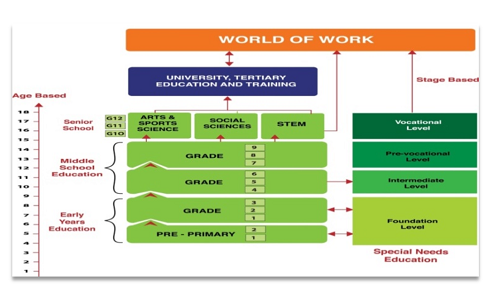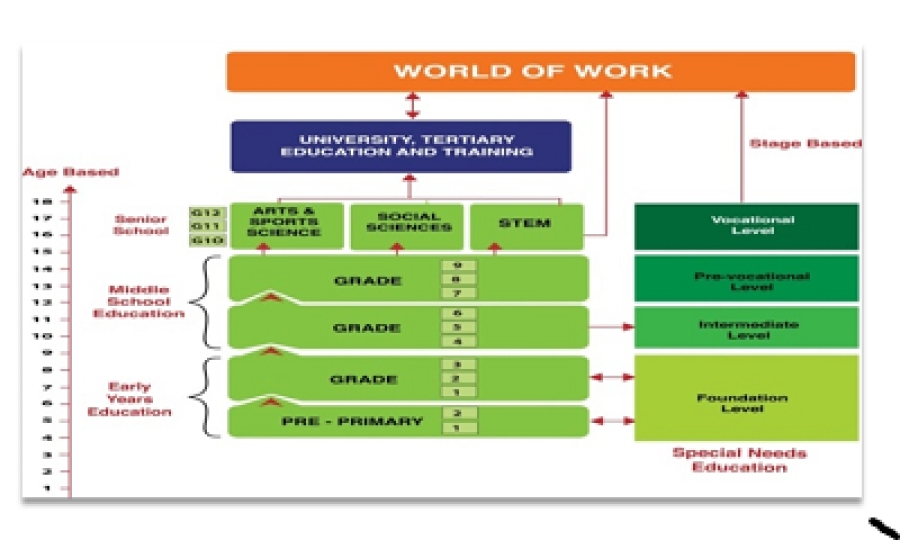Gearing for Junior Secondary: The Great Transition
By: Patrick Kogolla, Ag. Deputy Director Training CEMASTEA
Under the new 2–6–3–3–3 education system, commonly referred to as CBC, learners will spend a total of 17 years in school: two in pre-primary, six in primary school, three in junior secondary, three in senior secondary school and another three in university.

Learning progression in CBC
One of the critical milestones of implementing CBC is the transition of the learners currently in grade six to grade seven at Junior Secondary School (JSS). Junior Secondary school (JSS) is a stage of educational transition nested in most education systems between primary and senior secondary education. It is primarily for learners of Years 7, 8 and 9 and helps to ensure the bridge between primary and secondary school is safe, solid and consistent. In the Kenya context, grades 4, 5 & 6, together with grades 7, 8 & 9, form the middle school.
Junior Secondary Education will take three years; Grade 7, 8 and 9 for learners aged between 12 and 14 years. There will be 12 core/compulsory subjects in junior secondary. These are English, Kiswahili, Mathematics and Social Studies, Religious Education, Business Studies, Agriculture, life skills, Sports and Physical Education. New subjects include Integrated Science, Health Education and Pre-Technical and Pre-Career Education.
Learners with hearing impairment will undertake Kenyan Sign Language in place of English and Kiswahili. Integrated science, for example, will deal with basic concepts in science and some contents from physics, biology and chemistry. Pre-technical education prepares the learners for the world of work by instilling technical skills and knowledge needed to perform specific tasks. Pre-career Education seeks to prepare learners to choose their career paths after completing senior secondary in Grades 10, 11 and 12.
There will be a total of seven optional subjects in junior secondary. Learners will be allowed to choose a minimum of one and a maximum of two optional subjects. These subjects include Visual Arts, Performing Arts, Home Science and Computer Science, indigenous language and foreign languages, and learners' options to study the Kenya Sign Language. ICT will be cross-cutting in all subjects.
The Government has given resources to construct classes to accommodate the expected large numbers. Curriculum designs for grade seven are already out, and secondary school teachers are being trained to interpret and implement the designs. To join Junior Secondary Grade 6 learners in November 2022, sit the maiden national CBC assessment test- the Kenya Primary School Education Assessment (KPSEA). Approximately 1.24 million pioneer KPSEA candidates will join junior secondary schools in January 2023.
Junior secondary school will be closely watched as a transitional stage in CBC. While the die on CBC is cast and there is no going back, it will be necessary for those concerned to pick lessons and feedback to plough back and make the implementation smooth and successful as we advance. Lastly, it is essential to note that junior secondary school learners will mostly be adolescents. School leaders and teachers must focus on the child and as they implement their lessons. The focus should be geared to assist them in navigating self-efficacy and identifying their potential and worth. This way, the vision of CBC of ‘nurturing every learner’s potential’ will come alive.
Latest from Esther Nyambura
- CEMASTEA Hosts Successful INSET Centre Principals’ Workshop
- CEMASTEA Conducts Successful Holistic Learning Training for Rwandan Teachers
- Empowering Quality Standards and Assurance Officers (QASOs) for Enhanced STEM Education
- Science and Mathematics Teachers Pilot Symposium: Innovative Classroom Practices
- CEMASTEA Strategic Plan 2023 – 2027: Key Highlights

